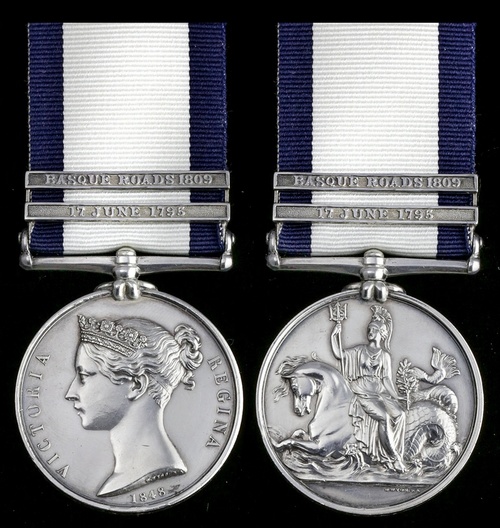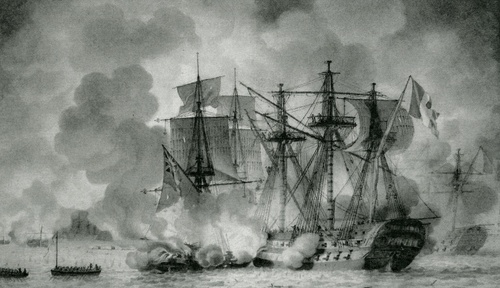Auction: 18002 - Orders, Decorations and Medals
Lot: 5
A fine Naval General Service Medal awarded to Captain Robert Hocking, Royal Navy, who was commissioned for his gallant service whilst en-route to Elba as a Prize Master: he aggressively beat off an attack by two larger vessels numbering 50 or 60 men, himself with '...but 5 hands on board and only 2 rusty 4-pounder guns'
He later made a career in cutting-out affairs, being wounded and again promoted, before becoming Signal Lieutenant to Lord Gambier at the Basque Roads as a result of his gallantry in command of a fireship
His close working relationship would see him called to give evidence at the infamous and sensational Court Martial of Lord Gambier later in the same year
Naval General Service 1793-1840, two clasps, 17 June 1795, Basque Roads 1809 (R. Hockings, Lieut. R.N.), minor edge nicks, good very fine
A unique 2-clasp award. Of approximately 42 '17 June 1795' clasps issued, this the only Officer of four issued to Pallas.
Robert Hockings was born in May 1776 at Gibraltar, a scion of a long-served military family. He joined the Royal Navy as an Able Seaman under the auspices of H.R.H. the Duke of Kent in 1790 and served in H.M.S. Ambuscade until February 1793. Having served as Midshipman in Eurydice, Zebra and Romney, he was appointed Master's Mate aboard Lapwing and Pallas, both commanded by Captain the Hon. Henry Curzon.
Pallas - '5 hands and 2 rusty 4-pounders'
Hockings served with her when Vice-Admiral the Hon. William Cornwallis's squadron brilliantly repulsed about 30 French ships off Ushant on 17 June 1795. Later, she captured a merchant-brig and Hockings was sent with her as Prize-Master to Elba via the Piombino Passage. Little did he know what would follow. O'Byrne takes up the story:
'He was attacked by two large row-boats containing about 50-60 men, whom, however, he beat off after a conflict of an hour, although he had but 5 hands on board, and only 2 rusty 4-pounder guns. This achievement was considered so gallant that on reaching Porto Ferrajo, where lay the Blanche, Captain Hon. Henry Hotham, he was highly complimented by that officer, and recommended by him to Earl St. Vincent, the Commander-in-Chief, by whom he was received on board his flag ship the Ville De Paris, and at once appointed, 29 April 1797, First-Lieutenant of the Hamadryad 36.'
Having been wrecked in the Bay of Algiers and dealt long-lasting body bruising on Christmas Day the same, he was appointed to Auroa and then Lisbon, he served with the latter in Mediterranean, and Newfoundland Stations until March, 1803, '...participating intermediately in the capture of many privateers, also in several cutting-out affairs (in one of which he was slightly wounded), in the destruction, too, of the French 20-gun ship Egalité, and in the land-operations at the reduction of Minorca.' [ibid]
Appointed Senior of the Phaeton, he acted as escort for Mr. Merry, the British Minister Plenipotentiary on a visit to North America and then proceeded to the East Indies; whilst cruising the China Seas, he went into action with the French frigate Sémillante, and in the capture of a ship of immense value on her annual passage from Manila to Lima.
Invalided home in January 1807, no doubt as a result of his extensive service, Hockings was appointed Signal-Lieutenant to Lord Gambier in the Ville De Paris in May 1808 and Caledonia in August 1808.
Fireship commander - 2nd promotion
At the Battle of the Basque Roads, the use of fireships was an issue of some debate. Lord Gambier understood their use and the devastation they could cause, but considered them '...a horrible mode of warfare, and the attempt very hazardous, if not desperate.'
With some considering their use both un-godly and un-British, Gambier stalled his decision, despite the fact that the time to strike was short. As a result Lord Cochrane, a young and aggressive officer whose reputation for danger preceded him was dispatched. His plan to send an armada of fireships into the French ships was advanced. Hockings was one of those appointed to command a fireship, seconded from his service with Gambier. O'Byrne states:
'As a reward for his subsequent conduct in command of a fire-ship during the celebrated attack made by the gallant Cochrane on the enemy's shipping in Basque Roads, he was presented with a second promotion dated 11 April, 1809 - previously to which period, as has been seen, he had been for nearly ten years First Lieutenant of a frigate.
Although not included in the list of the wounded on the last mentioned occasion, Hockings was severely hurt by the explosion of his vessel.'
Not wishing to remain idle on shore, he obtained permission soon after his promotion to rejoin the Caledonia. Despite the British victory being secured by 25 April, the character and command of Gambier was under investigation. As it was, Cochrane was a hero. He was appointed to the Order of the Bath and acted in every way possible to block any promotion, title, or decoration being furnished upon Gambier. Gambier however was well-connected and held sway in much of the court. A court-martial was called in July 1826, bringing into investigation the decisions made off the Basque Roads. Hockings was called on numerous occasions to bring evidence to the enquiry, which was unsurprisingly hung in the favour of Gambier. His accounts give a detailed first-hand account of the action, although the final result was Gambier being acquitted. The trial was sensational in Britain as it was clear to most that he had not seized upon the attack when conditions were most favourable. As it was, it was left to Cochrane and the gallant commanders of the fireships, Hockings among them, to drive fear into the hearts of the French to finally secure a victory.
Serving as a Volunteer until the close of 1810, Hockings was struck down with yellow fever from May 1811-October 1812. Returned to command Dominica in the Channel and West Indies, he captured the Providence, an American privateer schooner, 4 guns and 60 men in September. His final appointment in the sloop Medina from December 1820, resulted in his giving assistance to European consuls and merchants at Smyrna during the riots of 1821. He retired to Half-Pay in October 1846 and died in October 1849, having claimed this Medal.
Subject to 20% VAT on Buyer’s Premium. For more information please view Terms and Conditions for Buyers.
Sold for
£7,500







